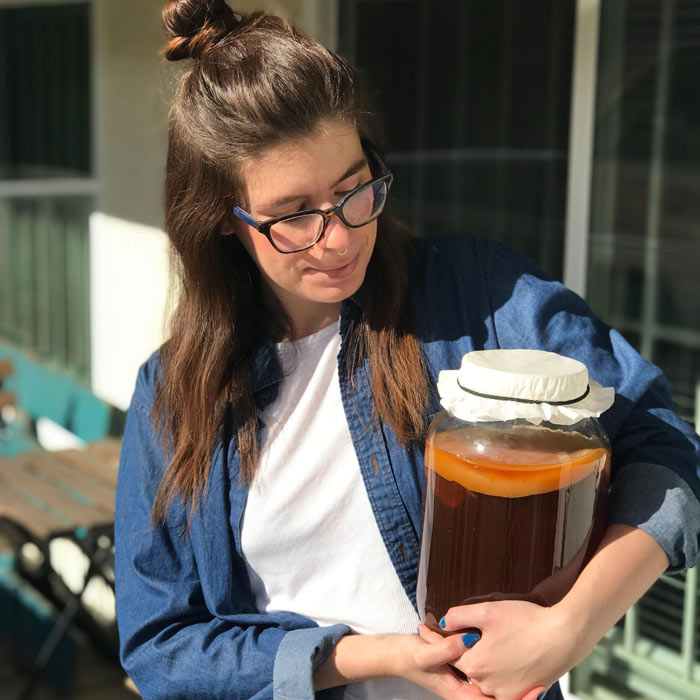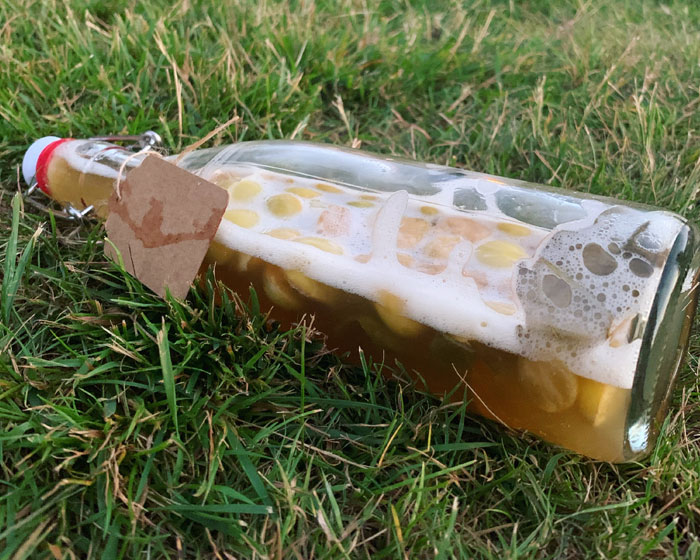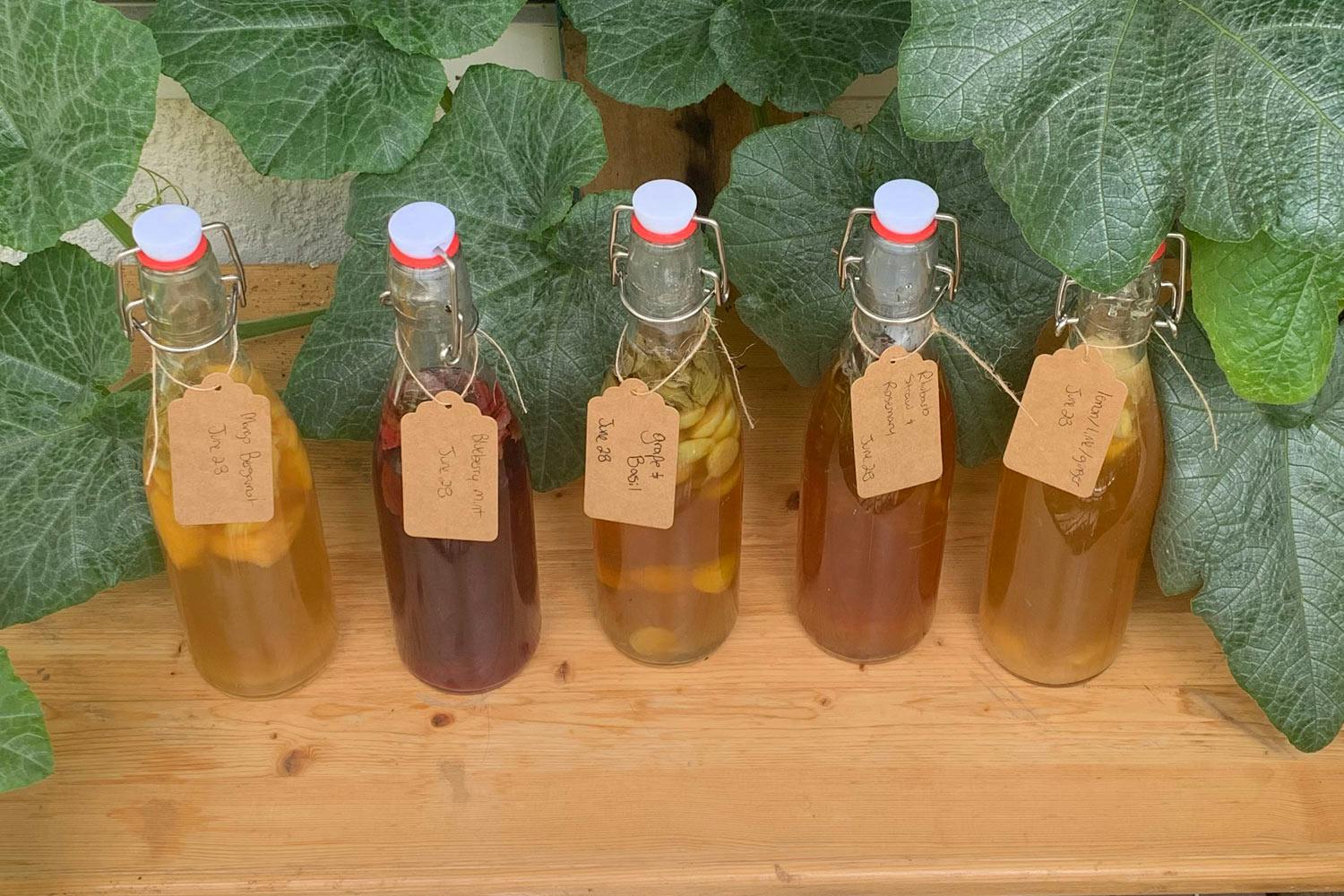Kombucha as Treaty
As I tend my scoby, I reflect on the ethics of relationships between people and the land.
A collection of the author’s home-brewed kombucha flavours
I was sitting at my auntie’s kitchen table with a stomachache, when she gave me my first glass of homemade ginger kombucha two years ago. She doted on me as if I were a child. Even though I was almost 30, I relished this care. I finished the glass and lay on her couch. She tucked me in and packed me a kombucha-making starter kit: a scoby in a glass jar, some Red Rose tea bags, and four bottles (three empty, one full of kombucha).
I was unsure how my baby scoby — a weird, discy blob — would make fermented tea, so I used my aunt’s texted instructions and did research to start my first batch. As I steeped the tea, added sugar, and observed it fermenting over two weeks, I thought how akin to the treaty process kombucha-making was.
Though most Canadians know treaties as the Numbered Treaties, or Post-Confederation Treaties, between First Nations people and the Crown (after which Canada perpetually and intentionally eroded them), self-governing Indigenous peoples had made treaties for millennia before contact with European colonizers. “Inter-Indigenous treaties were highly sophisticated oral agreements between sovereign peoples,” explains Métis writer and lawyer Chelsea Vowel in Indigenous Writes: A Guide to First Nations, Métis, and Inuit Issues in Canada. “They covered everything from trade arrangements to the settlement of conflicts, with specific consequences for their breach, and specific ways in which these treaties would be renewed.”
Growing up in a large family, I saw treaty ethics modelled by my relatives, especially my aunties.
Treaty, as a relationality framework, is a way of understanding how we tend to relationships. As a Nehiyaw-English-Irish person from Treaty 8 territory in Northern Alberta, treaty is something I feel I’ve understood in my body my whole life. Growing up in a large family, I saw treaty ethics modelled by my relatives, especially my aunties. I watched how they considered one another while they navigated conflicts and how involved they were with the greater community.
Due to colonization, genocide, and the government’s attempt to eradicate Nehiyaw knowledge systems, I wasn’t explicitly taught about the history of treaty-making or the significance of treaty relationships to Nehiyaw people. I’ve only recently begun thinking about treaty as a framework for my relationships with people, living things, and the lands I occupy.

It’s no surprise, then, that I started thinking about how making kombucha is like a treaty relationship. I nourish the scoby, whose name comes from “Symbiotic Culture Of Bacteria and Yeast” (a.k.a. the weird, discy blob); in return, it produces probiotic bacteria and antioxidants, which improve my digestion and health. I care for my kombucha and scoby, and they care for me.
Emily Riddle, a Nehiyaw writer from Treaty 6, once tweeted “treaty-making is kin-making.” As my kombucha-making practice grew, so did my kinship-making. I gave at least one bottle from every batch to a friend or kin — to care for them, their gut health, as my auntie did for me. Just as my auntie enabled me to care for myself and my gut flora, I started giving away my scobys as they replicated.
“Treaties are like any other sort of relationship: you do not enter into a relationship and then ignore the person afterwards,” writes Vowel. Relationships are complicated, which is why revisiting treaties (and relationships) is integral. Kombucha changes from brewer to brewer, from batch to batch. Kombucha and scobys are, at the end of the day, alive.
Treaties are like any other sort of relationship: you do not enter into a relationship and then ignore the person afterwards.
During the pandemic, my family began weekly cooking classes. Every Saturday, a different relative leads us in a chaotic class on Zoom. For my week, I started us all on making kombucha, sending my aunties, parents, and sister scobys through the mail. (My cousin in Edmonton got one from a friend who got her first scoby from me. The exchange made my heart sing.)
My lesson began with a detailed PowerPoint. Then, we made batches together virtually. A week later, my dad’s batch formed mould, necessitating a few calls to reassess what his kombucha and scoby needed. My aunties called with questions throughout the fermentation process. Revisiting and renewing relationships is core to treaties. So too, kombucha-making. Spreading my resources and knowledge about kombucha is important for my relationships. Treaty is knowledge-sharing, too.

While I make kombucha, I think about treaty ethics as a Nehiyaw person living on the unceded, ancestral territory of the Musqueam, Squamish, and Tsleil-Waututh nations. I shouldn’t take from these lands without living in reciprocity. Dispersing scobys all over Metro “Vancouver” (and now into Treaty 6 and Treaty 8 territories) isn’t enough. I need to think about how I’m actively supporting these communities and their right to self-determination, which is also important for you to reflect on, dear reader. Ask yourself: How are you working toward land reparations and returns, and supporting Indigenous sovereignty on lands you occupy?
Perhaps this question seems like a big jump — from my relationship to kombucha-making to my relationship with family to my relationship with the land’s original stewards. But this is the depth of treaty relationships: the interconnectivity between our bodies, our kinship networks, and the world. Treaty is a web, not a straight line. Like replicating scobys, treaties grow in all directions. Every relationship layer that develops is important, necessitates revisiting, and deserves attention and care.
Note: An earlier version of this essay first appeared in the zine Critical Booch in 2019.
Print Issue: Summer/Fall 2020
